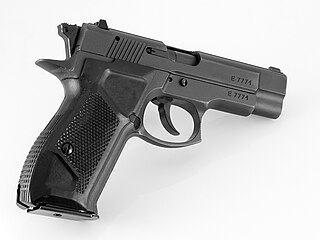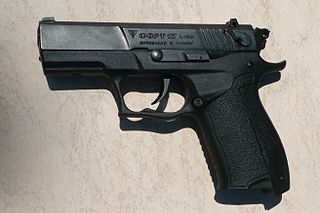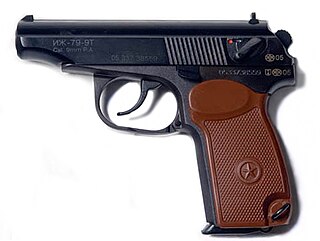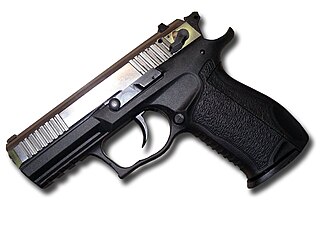
A traumatic pistol or traumatic handgun is a non-lethal weapon in the form of a pistol that fires non-lethal projectiles, typically rubber bullets. [1]
Contents
Some gas pistols have an option of loading rubber bullets. [2]

A traumatic pistol or traumatic handgun is a non-lethal weapon in the form of a pistol that fires non-lethal projectiles, typically rubber bullets. [1]
Some gas pistols have an option of loading rubber bullets. [2]

Rubber bullets are a type of baton round. Despite the name, rubber bullets typically have either a metal core with a rubber coating, or are a homogeneous admixture with rubber being a minority component. Although they are considered a less lethal alternative to metal projectiles, rubber bullets can still cause fatal injuries as well as other serious injuries such as blindness or other permanent disabilities.

The KS-23 is a Soviet shotgun. Because it uses a rifled barrel, it is officially designated by the Russian military as a carbine. KS stands for Karabin Spetsialniy, "Special Carbine". It is renowned for its large caliber, firing a 23 mm shotgun shell, equating to 6.278 gauge using the British and American standards of shotgun gauges and approximately 4 gauge using the current European standards, making it the largest-bore shotgun in modern use.

The Saiga-12 is a shotgun available in a wide range of configurations, patterned after the Kalashnikov series of rifles and named after the Saiga antelope native to Russia. Like the Kalashnikov rifle variants, it is a rotating bolt, long-stroke gas piston operated firearm that feeds from a square magazine. All Saiga-12 configurations are recognizable as Kalashnikov-pattern guns by the large lever-safety on the right side of the receiver, the optic mounting rail on the left side of the receiver and the large top-mounted dust cover held in place by the rear of the recoil spring assembly. Saiga firearms are meant for civilian domestic sale in Russia, and export to international markets.

The Nagant M1895 is a seven-shot, gas-seal revolver designed and produced by Belgian industrialist Léon Nagant for the Russian Empire.

The Stechkin or APS is a Soviet selective fire machine pistol that is chambered in 9×18mm Makarov and 9×19mm Parabellum. It was introduced into service in 1951 for use by artillery and mortar crews, tank crews and aircraft personnel, for whom a cumbersome assault rifle was deemed unnecessary, and saw service in a number of wars including the Vietnam War, Russo-Ukrainian War and Syrian Civil War. The APS was praised for its innovative concept and good controllability for its size. However, the high cost of the weapon, complex and time-consuming machining, combined with a limited effective range, large size and weight for a pistol, and fragile buttstock have been mentioned as a reason to phase it out of active service in favour of assault rifles such as the AKS-74U. The pistol bears the name of its developer, Igor Stechkin.

The Fort-12 is a semi-automatic pistol which was designed in the late 1990s by Ukrainian firearms designer RPC Fort.

The PSM was designed by the Tula Design Bureau in 1969 as a self-defense firearm for law enforcement and military officers of the USSR. The pistol entered production at the Izhevsk Mechanical Plant in 1973.

The MP-443Grach or "PYa", for "Pistolet Yarygina", following traditional Russian naming procedure, is currently the Russian standard military-issue side arm.

The Fort 17 is a semi-automatic pistol which was designed in the year 2004 by Ukrainian firearms designer RPC Fort.

The P-96 is a Russian 9 mm semi-automatic pistol designed by the KBP Instrument Design Bureau for the Russian Armed Forces. The pistol was not accepted and then offered in a modernized form for law enforcement and security firms.
The OTs-01 Kobalt is a Russian double-action 9 mm revolver designed by Igor Stechkin and Boris Avraamov.

The PP-91 Kedr is a 9mm machine pistol developed from a prototype from the 1970s and since 1994 adopted by the Russian Ministry of Internal Affairs.

The "Makarych" is a family of Russian non-lethal gas pistols with the ability to fire ammunition with rubber bullets.

The PB-4 Osa, is a family of Russian non-lethal pistols that can be also used as a flare gun, a flashbang gun, or a starting pistol. The system consists of the pistol, and various ammunition types.

Klimovsk Specialized Ammunition Plant (CJSC KSAP) (Russian: Климовский специализированный патронный завод, romanized: Klimovskiy spetsializirovannyy patronnyy zavod) is an ammunition enterprise located in Russian town Klimovsk near Podolsk in the Moscow region. 7.62×39mm cartridges and wide variety of other service cartridges for various Russian handguns are produced.

The Horhe is a family of Russian non-lethal pistols, based on Ukrainian Fort 12 and Fort 17 pistols, Horhe are produced since 2006 by joint-stock company Klimovsk Specialized Ammunition Plant.

The GM-94 is a pump action grenade launcher for use by Russian special and security forces. Development of the GM-94 grenade launcher began in 1993, under the guidance of Vasilij Gryazev, chief designer of the KBP design bureau (Konstruktorskoye Byuro Priborostroyeniya;, in Tula, Russia.
Ukrainian law allows firearm ownership on may-issue basis. With approximately 10 civilian firearms per 100 people, Ukraine is the 88th most armed country in the world per capita, and 22nd overall.

The MP-461 is a Russian compact non-lethal pistol.
Gun control in Russia is carried out in accordance with the Federal Law on Weapons. The law establishes three major categories of weapons: civil, service, and military.